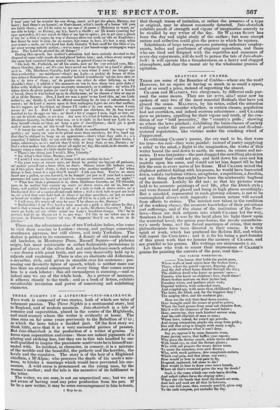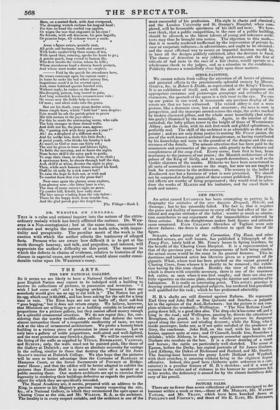BEAUTIES OF CRABBE.
THESE are some of the Beauties of Cmbbe—where are the rest? However, let us rejoice at having so much in so small a space, and at so small a price, instead of regretting the absent.
CRABBE and MALTHUS, two clergymen, by different ends pur- sued the same means. They are (or were, alas! must now be spoken of one) two of the most essential Radicals that have yet 0-raced the cause. MALTHUS, by his ratios, called the attention of the country to consider whether, in certain classes, population had not overtaken, and indeed overrun subsistence : and Canns gave us pictures, appalling for their vigour and truth, of the con- dition of our " bold peasantry," the " country's pride ;" showing us where the laws pinched; exhibiting the basis-classes of society writhing under the pressure of partial institutions and ill-admi- nistered regulations, like victims under the crushing wheel of Juggernaut. In criticising CRABBE'S poems, the cry used to be, they were too true—too real—they were painful; instead of poetry supplying a relief to the mind, a flight to the imagination, the works of this writer bound the soul down to earth, its cares, its crimes and mi- series. It was butjustice—the poet dragged the unwilling physician to a patient that could not pay, and held down his eyes and his nostrils upon his sores, and would not let him depart till he had felt the case in every nerve of his frame. Had CRABBE mixed the slightest political feeling with his poems, he would have been cried down, voteda turbulent citizen, an agitator, a republican, a Jacobin, and any thing else that might have beenthe aristocratic bugbear of the moment. Luckily he did not ; so that his pictures were held to be accurate paintings of real life, after the Dutch style; and were framed and glazed and hung in high places accordingly. But a mischief, represented in such glowing colours, is not to be contemplated always with impunity : human nature will ascend from effects to causes. The interest now taken in the condition of the working classes, the accurate knowledge of their privations and sufferings, and of the abuse of the institution of the Poor- laws—these are dark subjects into which CRABBE led the way, flambeau in hand : it was by the lurid glare his light threw upon the wretched hovel, the prison poor-house, the moody manufactit- rer's needy home, and the forced marriages of crime, that many philanthropists have been directed in their course. It is this spirit at work, which has produced the Reform Bill, and which will repeal the Corn-laws ; and it is for his being a part-founder of this great work that we honour the memory of CRABBE, and are grateful to his genius. His writings are monuments 7; ttiL Let those who wish to renew their impressions of CRABBB'S genius for painting the sorrows of the poor, read this-
THE PARISH WORKHOUSE.
Yon house, that holds the parish poor, Whose walls of mud scarce bear the broken door; There, where the putrid vapours, flagging, play, And the dull wheel hums doleful through the day; The children dwell who know no parents' care— Parents, who know no children's love, dwell there ! Heart-broken matrons on their joyless bed, Forsaken wives, and mothers never wed; Dejected widows, with unheeded tears, And crippled age, with more than childhood's fears; The lame, the blind, and, far the happiest they ! The moping idiot, and the madman gay.
Here too the sick their final doom receive, Here brought amid the scenes of grief to grieve, Where the loud groans from some sad chamber flow, Mix'd with the clamours of the crowd below ; Here, sorrowing, they each kindred sorrow scan, And the cold charities of man to man; Whose laws, indeed, for ruin'd age provide, And strong compulsion plucks the scrap from pride ; But still that scrap is bought with many a sigh, And pride embitters what it can't deny.
Say ye, oppress'd by some fantastic woes, jarring arring nerve, that baffles your repose;
Who press the downy couch, while slaves advance With timid eye, to read the distant glance ; Who with sad prayers the weary doctor tease, To name the nameless, ever-new disease ; Who with mock patience' dire complaints endure, Which real pain, and that alone, can cure; How would ye bear in real pain to lie, Despised, neglected, left alone to die? How would ye bear to draw your latest breath, Where all that's wretched paves the way for death?
Such is the room which one rude beam divides, And naked rafters form the sloping sides ; Where the vile bands that bind the thatch are seen, And lath and mud are all that lie between, Save one dull pane, that, coarsely patch'd, gives way To the rude tempest, yet excludes the day.
Here, on a matted flock, with dust o'erspread, The drooping wretch reclines his languid head : For him no hand the cordial cup applies, Or wipes the tear that stagnates in his eyes ! No friends, with soft discourse, his pain beguile, Or promise hope, till sickness wears a smile. • Anon a figure enters, quaintly neat, All pride and business, bustle and conceit ; With looks unalter'd by these scenes of wo, With speed that, entering, speaks his haste to go A potent quack, long versed in human ills, Who first insults the victim whom he kills; Whose murderous hand a drowsy bench protect, And whose most tender mercy is—neglect.
— Paid by the parish for attendance here, He wears contempt upon his sapient sneer ; In haste he seeks the lied where misery lies, Impatience mark'd in his averted eyes ; And, some habitual queries hurried o'er, Without reply, he rushes on the door. His drooping patient, long inured to pain, And long unheeded, knows remonstrance vain : He ceases now the feeble help to crave Of man ; and silent sinks into the grave.
But ere his death, some pious doubts arise, Some simple fears, which "bold bad" men despise: Fain would he ask the parish-priest to prove His title certain to the joys above ; For this he sends the murmuring nurse, who calls The holy stranger to these dismal walls. And doth not he the pious man, appear,
He_, "passing rich with forty pounds a year ?" Ah ! no, a shepherd of a different stock,
And far unlike him, feeds this little flock; A jovial youth, who thinks his Sunday's task As much as God or man can fairly ask ; The rest he gives to loves and labours light, To fields the morning, and to feasts the night. None better skilrd the noisy pack to guide, To urge their chase, to cheer them, or to chide;
A sportsman keen he shoots through half the day,
And, skill'd at whist, devotes the night to play.
Then while such honours bloom around his head,
Shadhe sit sadly by a sick man's bed
To raise the hope he feels not, or with zeal
To combat fears that e'en the pious feel?
Now once again the gloomy scene explore, Less gloomy now—the bitter hour is o'er, The man of many sorrows sighs no more. Up yonder hill, behold, how sadly slow The bier moves winding from the vale below : There lie the happy dead, from trouble free,
And the glad parish pays the frugal fee. The Village—Book I.




























 Previous page
Previous page